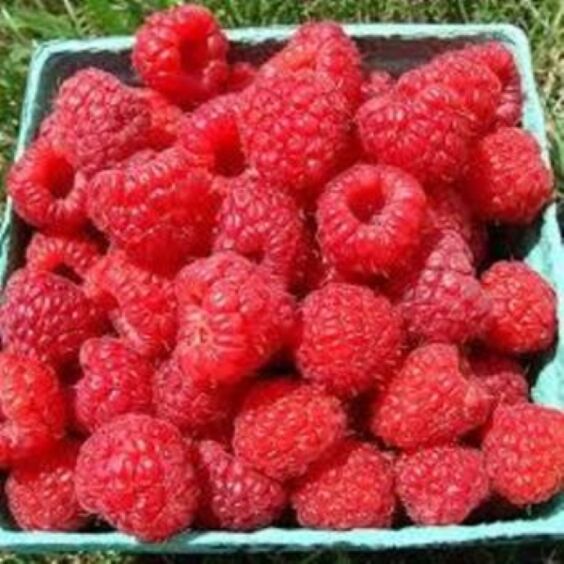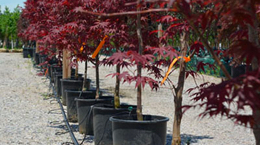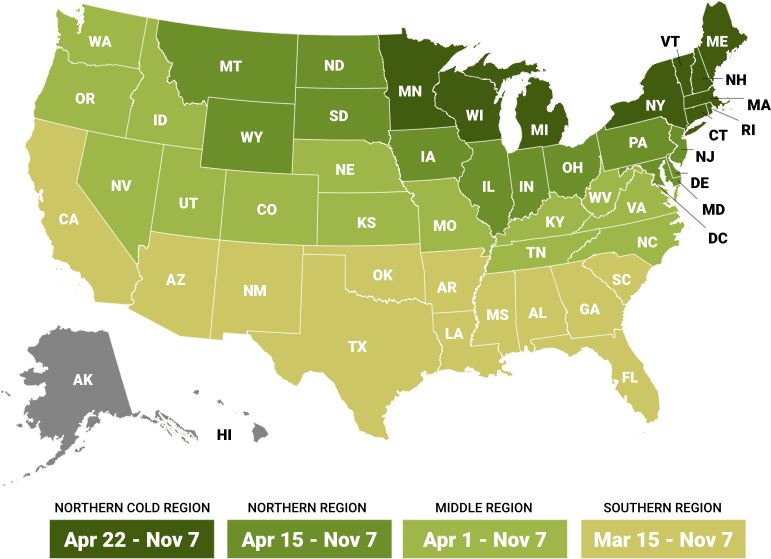
Growing zones
See Zone Map >Status: In stock
- Sun
Mature Plant Size (H x W): 4-5' x 2-3'
Bloom Season: Spring
- Attracts Bees
- Attracts Birds
- Edible to People
- Attracts Butterflies
Planting & Care for Edible Plants – Killarney Raspberry
Preparation
- The Killarney Raspberry has a rich, sweet flavor. It is an excellent raspberry to use in your baked goods or can be eaten as fresh fruit.
- It is a hardy raspberry plant and is disease-free/resistant.
- Harvest its plentiful berries and freeze, can, eat, or bake the remainders.
- The berries can also be used to make jams or jellies.
- Killarney Raspberry is self-pollinating.
- Cut out old canes after they fruit, but leave new canes to produce berries the next year.
Opening Plant Material
- Bare Root - Cut open the bundle (top and roots are tied) and separate all the plants. Soak roots in buckets of water until planted. Each plant type will be labeled separately for identification. Do not expose the roots to sun. They should never dry out. Keep roots covered. All bare-root plants must be trimmed when planted.
Planting Bare Root
- Soak roots in water overnight before planting, if possible
- Plant 2 to 3 feet apart in rows 3 to 5 feet apart in well-tilled weed-free soil.
- Dig a hole at least 6" wider and the same depth as the root mass.
- The crown or graft of the plant should be slightly higher than ground level where it was grown at our nursery.
- Trim off the broken roots and branches.
- Spread the roots and fill halfway with soil, then water until soil settles completely saturating the soil and planting pit.
- Re-adjust plant and fill the hole with the rest of the soil.
- Back-fill the balance of the soil and water well.
- Click the link below “Handling & Planting Guideline” to see illustrations on planting bare root raspberries.
Pruning – After Planting
- After planting, be sure to prune the bare-root canes back to about 2 inches above the ground. Do not skip this step! It is a crucial factor in encouraging the roots to send up new growth during the growing season.
Pruning - Through-out the Season
- Once your raspberry plants have put on enough growth (which may not be until after their first year with you), aim to prune in the early spring, just as new growth emerges.
- Prune young canes back until they are around 4 to 5 feet tall. This will discourage overgrowth and shading and will improve fruit production and quality.
- Completely prune back and remove all skinny, dead, damaged, diseased or otherwise weak canes. As your raspberry plants mature, it is recommended that you cut back the small, thin canes to leave only about 8 to 10 of the strongest ones.
Watering - After Planting
- If summer brings about one to one and a half inches of rainfall every week or so, you won’t need to use the hose. But if it gets really dry, you can give your new plant a good, thorough soaking. The best way to do this is to let your garden hose trickle slowly. This gives the water a chance to soak in instead of running off. You can also use a soaker hose to water several plants at once.
Watering - Through-out the Season
- Water newly planted crowns, and keep soil moist throughout the growing season.
- How do you know if your plants need water? The easiest way to tell is to touch the soil around the roots. If it is moist, there is no need to water. If it is dry, give it a good soaking with the hose end (no nozzle) watering the soil only, not the leaves.
- Stick your finger into the soil around 3” to check soil moisture.
Planting & Handling Help
Download our Planting and Handling Guide below to plan for a successful arrival and install of your plants. Be sure to water all plants as soon as they arrive and every day until you’re ready to plant. Keep any bare root bundles in a shady, cool spot with the roots covered at all times.


Learn More
Watch our videos on handling bare root plants, how your order is prepared for shipment and more.


Plant Sizing
What is the difference between Containers, Grow Bags, Bare Root, and Balled & Burlap (B&B)?
Shipping Times


Our FedEx and local shipping times depend on two factors, one is by the region and the second is the type of product being shipped. For example, small fruits are only shipped in spring, but majority of our perennials are shipped from spring until fall. Keep in mind the dates below act as a general guide. Due to unpredictable weather, staffing, inventory and industry demands these timelines can change. Therefore, we cannot guarantee any of these times.
Shipping Dates by Region*
Northern Cold Region: April 22nd - November 7th
Northern Region: April 15th - November 7th
Middle Region: April 1st - November 7th
Southern Region: March 15th - November 7th
Local Delivery (small radius from Waterloo, WI): April 22nd - November 7th
Shipping Dates by Season*
Spring Shipping: Region Start Date (above) - May
Fall Shipping: September - November
Due to unpredictable weather, these times may vary. Some varieties are exceptions due to heat and plant health reasons. Enter your shipping zip code at the top of this page and be sure to check the shipping information on each product before you add it to your cart. If the product is too large or restricted in your state, you will not be able to checkout with that item in your cart.





